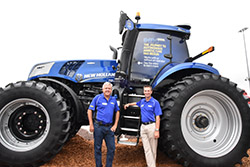 Eighteen grants with a total sum of $6.7 million dollars are being granted by the USDA‘s National Institute of Food and Agriculture (NIFA). The grants are to encourage researching the interactions between components of an agroecosystem interact in food production: soil, water and sun to plants, animals and people.
Eighteen grants with a total sum of $6.7 million dollars are being granted by the USDA‘s National Institute of Food and Agriculture (NIFA). The grants are to encourage researching the interactions between components of an agroecosystem interact in food production: soil, water and sun to plants, animals and people.
“Population growth, along with environmental factors, including the growing threat of climate change, are putting increasing demand on the land, water and other resources that produce our food,” said Agriculture Secretary Tom Vilsack. “These investments will help us understand how we can farm more effectively and sustainably to feed the growing global population.”
NIFA’s AFRI Foundational: Bioenergy, Natural Resources, and Environment Program supports research on healthy agroecosystems and their underlying natural resources essential to the sustained long-term production of agricultural goods and services. Agroecosystems may include crop production systems, animal production systems, and pasture, range and forest lands that are actively managed to provide economic, societal and environmental benefits. Projects funded through this program area contribute to the knowledge needed for sustainable production of agroecosystems while retaining needed ecosystem services-such as drinking water, pollination and climate regulation.
2016 Awards go to:










